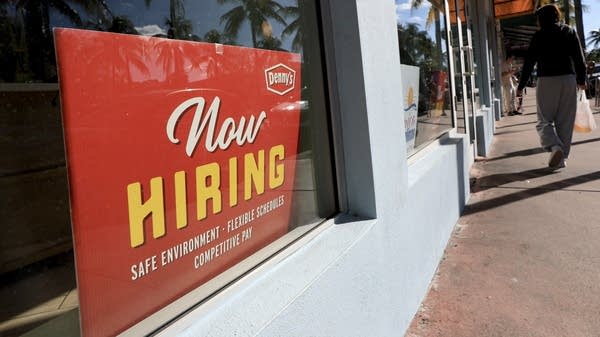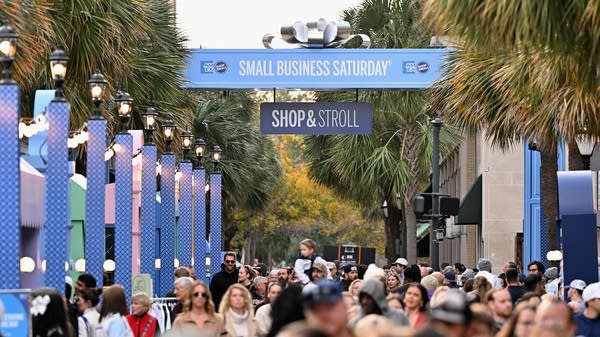Amid tariff turmoil, a flower company CEO finds “peace” in expecting the unexpected
“I've had to pick up the pieces so many times that I know that we can get through it,” said Farmgirl Flowers CEO Christina Stembel.

Christina Stembel, the CEO of the direct-to-consumer floral company, Farmgirl Flowers, has seen her share of blooms and busts over 15 years in business. Previously, she spoke with “Marketplace” host Kai Ryssdal about the sudden shutdown of her facilities during the onset of the COVID pandemic, how supply chain disruptions nearly sank her business, and the scary moment when her bank, Silicon Valley Bank, collapsed.
Now, as President Donald Trump’s trade barriers threaten to disrupt her business once again, Stembel spoke with Ryssdal about the long-term future of the company. The following is an edited transcript of their conversation.
Christina Stembel: (The new tariffs) definitely threw a wrench in everything. I feel like I've said that phrase with you a lot over the years. The next Monday after that, we were supposed to launch our Mother's Day offerings, so we'd already, you know, priced it all out with all of our partners, and then found out about the tariffs, and everybody just kind of freaked out a bit. You know, one of our bouquets usually has about 20 different types of flowers and greens in it. They're sourced from everywhere, from the U.S., from South America, from Europe —
Kai Ryssdal: So in one bouquet, you have various sourcing supply chains, right?
Stembel: Absolutely. So, you know, at first it was 25% (tariffs) from Europe and 10% from South America. Then it's like, ‘OK, well, which products can we substitute?’ So it was a lot of spreadsheeting and trying to figure things out, and then getting on the phone with every vendor to figure out what it was gonna look like.
Ryssdal: We've talked a lot, you and I, about the trials and tribulations of the logistics of your business, but it's incomprehensibly more complicated now because of what the president is doing right?
Stembel: Absolutely it is. I wrote a letter to all of our customers and followers about it and, you know, I was really trying hard not to get political about it, because that's the first way to get people to just turn off their ears, especially because, when I started, we were only sourcing American grown flowers. I really believed in this. I grew up on a farm in northern Indiana. You know, I tried (to source) only American flowers, but we ran out of flowers, and we had to start sourcing internationally. I tried to do only American manufacturing — made everything in-house from our 40,000 square foot warehouse in San Francisco. We made no profit, so I had to try a different way. There's no way I could go back to that.
Ryssdal: You and I have spoken, I don't know, six or eight times over the last I don't know, eight-ish years, and almost every time that you and I talk, you have a relentless optimism and hope. But you sound a hair more, not downbeat, not defeated, but, but there's — OK, sorry about this pun that's about to come — the bloom is off the rose maybe?
Stembel: Oh, that's interesting, because I actually feel the opposite, I think. I think right now I have a lot of assurance, because I've had to pick up the pieces so many times, that I know that we can get through it. I just know it's gonna be hard. Where in the past, there were so many times that I really didn't know if we were going to (make it). I mean, sadly, it means people's jobs, it means cutting corners in ways that I don't want to cut corners, but I know we can get to the other side of it. So you probably are hearing a calmness about me that usually isn't there.
Ryssdal: How much longer are you gonna keep doing this?
Stembel: That's interesting. You know, I think when I talked to you a couple of years ago, I was really determined to sell the company. That's what I built it for. I gave myself 10 years, and then I gave myself 15 years, and, you know, always went past that date many times. Now I've completely changed my perspective, and I think that's also given me a bit of calmness, a bit, because now I'm not building it to sell. I'll probably be doing this another 10 or 15 years at least. I'm just building it to be like the 99% of businesses out there that are small businesses and that aren't doing the Silicon Valley dream of trying to get, you know, hundreds of millions of dollars at the end of the day, and that has actually given me a lot of peace. So there'll probably be at least 10 more shoes dropping, but I know we'll get to the other side of it.













